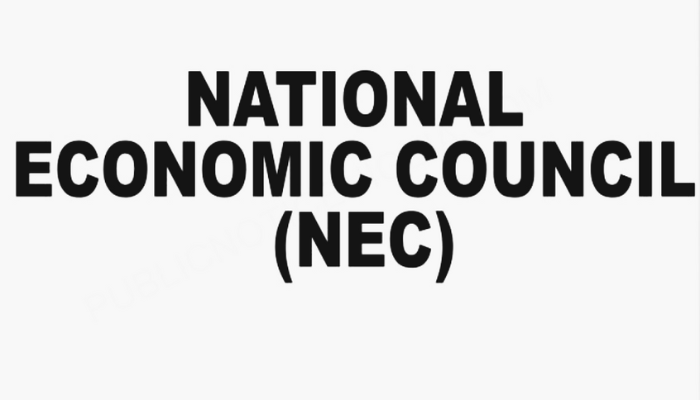NEC expands oil theft committee to solid minerals coverage
…endorses Tinubu’s $1 trillion economy plans
…sets up panel to revamp security training institutions
The National Economic Council (NEC), on Thursday, announced that it had approved the expansion of its Ad-hoc Committee on Crude Oil Theft Prevention and Control to include oversight of Nigeria’s solid minerals sector amid growing insecurity, illegal mining and revenue loss concerns
Governor Hope Uzodimma of Imo State and Chairman of the Committee, told State House Journalists on Thursday, after the expanded 153rd Meeting of NEC attended by President Bola Tinubu, Vice President Kashim Shettima, Senate President Godswill Akpabio, Benjamin Kalu, the Deputy Speaker; House of Representatives and Governors of the 36 States.
Read also: NUPRC refutes report on N8.4trn oil theft claim
This is just as the Council also approved measures to strengthen macroeconomic reforms, security and domestic production
BusinessDay gathered that the decision followed significant progress made in curbing crude oil theft and boosting daily production.
Governor Uzodinma recalled that before President Bola Tinubu assumed office in May 2023, Nigeria’s crude oil production had averaged between 700,000 and 800,000 barrels per day, a situation that prompted the reconstitution of the Committee.
“Working with critical stakeholders, including regulators, operators, and the armed forces, we adopted a collaborative approach involving all governors of oil-producing States,” Uzodinma said.
“Today, daily production exceeds 1.7 million barrels, while cases of pipeline vandalism and crude theft have declined.”
Governor Uzodimma, who stated that NEC was satisfied with the Committee’s interim report, added: “We agreed to broaden its mandate to cover solid minerals, where illegal mining of gold and other resources has deprived the country of substantial earnings.”
He also revealed that the Committee recommended that the NNPC, in collaboration with security agencies and consultants, strengthen surveillance across creeks and offshore facilities to prevent illegal vessel movements around export terminals.
Governor Uba Sani of Kaduna State, while also briefing on the outcome of the meeting, disclosed that NEC also approved President Bola Tinubu’s proposal to establish a high-level committee for the revamp of training institutions for security agencies nationwide.
Read also: International syndicates behind oil theft in Nigeria
The decision followed a presentation by Atiku Bagudu, Minister of Budget and National Planning, who highlighted the importance of security investments to the President’s $1 trillion economy vision by 2030.
Citing Section 130 (2) of the 1999 Constitution, he recalled that the President serves as “Head of State, Chief Executive of the Federation, and Commander-in-Chief of the Armed Forces,” while Section 13 mandates all authorities and persons exercising powers to uphold the Constitution and apply its directive principles of State policy.
“The memo recognises the president’s deep respect for federalism and highlights the achievements made through collaboration between the Federal and State Governments over the past two and a half years,” the minister said.
He noted that measures such as macroeconomic reforms, security interventions, the Renewed Hope Infrastructure Fund, and grassroots development programmes had strengthened the economy and laid the groundwork for accelerated growth.
Bagudu proposed six key resolutions (“prayers”) which were approved by the Council, including Regular Briefings on Economic Stability: The Coordinating Minister of the Economy, the Central Bank Governor, and the Minister of Budget and Economic Planning are to periodically brief NEC on policies supporting macroeconomic and monetary stability.
Sustained Infrastructure Collaboration: The Renewed Hope Infrastructure Fund shall remain a collaborative vehicle for nationwide infrastructure development, with periodic progress reports to NEC.
Enhanced Security Funding: Cooperation on national security shall continue, with additional investments to be determined by the President on NEC’s recommendation.
Sani said the President and Governors expressed concern over the dilapidated state of police training facilities, agreeing that their rehabilitation was vital to improving morale and professionalism within the force.
The new Committee is headed by Governor Peter Mbah of Enugu State and it includes Governors Uba Sani (Kaduna), Dapo Abiodun (Ogun), Agbu Kefas (Taraba), Umo Eno (Akwa Ibom), Dauda Lawal (Zamfara), and Abdullahi Sule (Nasarawa).
The Council approved the appointment of Alkali Baba, former Inspector-General of Police, as Secretary of the Committee, which has one month to conduct on-the-spot assessments of all training institutions and submit recommendations for joint Federal and State intervention.
Read also: Troops foil ₦263m crude theft, crack down on oil theft syndicates in Niger Delta
Governor Sani said NEC also directed the Committee to extend its review to other security agencies, ensuring that their training facilities are rehabilitated and equipped to meet operational demands.
“The President urged governors to continue prioritising grassroots development and the welfare of citizens,” he added.

